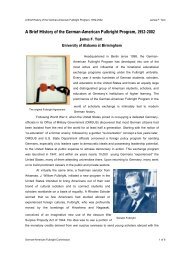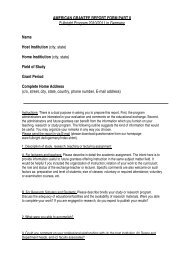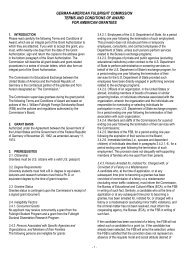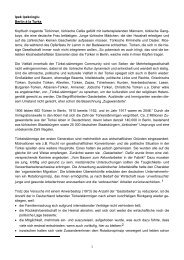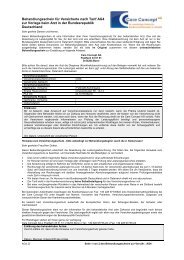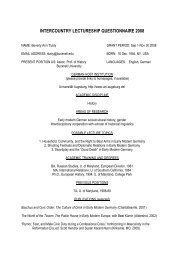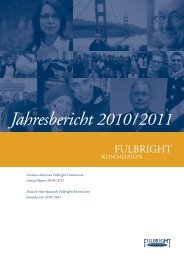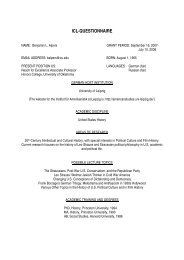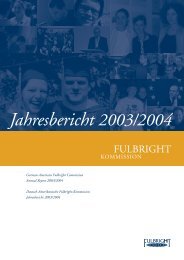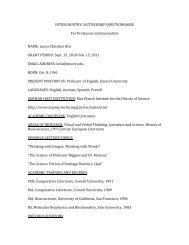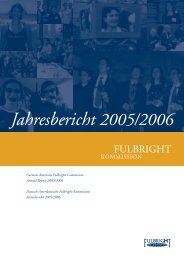The First Class of Fulbrighters - Fulbright-Kommission
The First Class of Fulbrighters - Fulbright-Kommission
The First Class of Fulbrighters - Fulbright-Kommission
You also want an ePaper? Increase the reach of your titles
YUMPU automatically turns print PDFs into web optimized ePapers that Google loves.
German lessons in the garden in Bad Honnef. <strong>The</strong> lessons were part <strong>of</strong> the routine during orientation.<br />
Understanding lectures at the university, which I<br />
attended faithfully, was another matter. I include myself<br />
among the large number <strong>of</strong> <strong><strong>Fulbright</strong>ers</strong>, who had difficulty<br />
comprehending lectures during the first semester. But<br />
persistence paid <strong>of</strong>f. In the second semester I could usually<br />
follow the lectures <strong>of</strong> my pr<strong>of</strong>essors in German history and<br />
political science. My favorites were Pr<strong>of</strong>essor Hans Rothfels,<br />
who lectured on Bismarck with authority, and<br />
<strong>The</strong>odor Eschenburg, who could entertain his attentive<br />
audience with digressions on the follies <strong>of</strong> politicians in<br />
Central and Eastern Europe. I even ventured to take a seminar<br />
on the <strong>First</strong> World War and to write an extensive<br />
paper in German.<br />
THE CONTRAST between a highly cultured Germany<br />
and its National Socialist past was still in the back <strong>of</strong> my<br />
mind. I had been conscious <strong>of</strong> this contrast ever since my<br />
father had served as a Protestant chaplain to German war<br />
1) Now Fort Drum<br />
28 29<br />
prisoners at Pine Camp 1 in northern New York State in<br />
1944-45. As it developed, my research interest centered<br />
around the interaction <strong>of</strong> religion and politics. Eventually,<br />
in 1984, I published a book, <strong>The</strong> Old Prussian Church and<br />
the Weimar Republic, that explored this theme by focusing<br />
on the largest <strong>of</strong> the German Protestant Landeskirchen. Here<br />
I could explain why the Weimar Republic failed to elicit<br />
respect. But the book did not proceed chronologically to<br />
explain why Nazism prevailed among many respectable<br />
church people, at least during the first years <strong>of</strong> the Third<br />
Reich. That question still boggles my mind.<br />
My <strong>Fulbright</strong> year drew to a close as the U.S. Army<br />
beckoned and as my stipend gave out in the summer <strong>of</strong><br />
1954. <strong>The</strong> year had turned out to be the grand adventure<br />
that I had anticipated. I bade farewell to friends in Tübingen,<br />
traveled south to Gibraltar, and boarded a waiting ocean<br />
liner for home and family.



